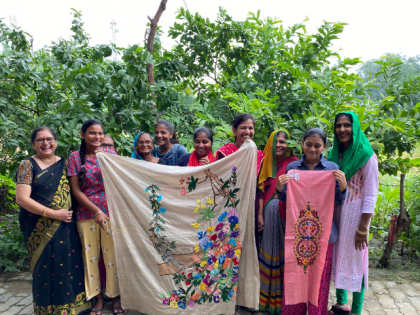Grameen Hunarmand Finds Hope In Modi's New India
By Impact Desk | Updated: September 23, 2022 17:36 IST2022-09-23T17:34:24+5:302022-09-23T17:36:11+5:30
Skill mapping in villages and deep down rural areas has found that India has a lot of raw potential ...

Grameen Hunarmand Finds Hope In Modi's New India
Skill mapping in villages and deep down rural areas has found that India has a lot of raw potential that remains un-trained and needs to be specialised in the creative skills that had existed here from a long time. The simplistic people in villages are not enlightened with market connectivity, customer insights, niche marketing and the modern management knowledge. They know hunger, education, health and matters of governance that touch them directly, sustaining them in their comfort zones by government subsidies like many of them which are also very important in stressful times. As management doyen, C.K Prahalad mentions -" Poor are value conscious by necessity " - in his book, Fortunes at the bottom of the pyramid. Crafts and related arts development was never seen as a mainstream source of income generation. Before 1947, in the pre-industrialisation era, Indian villages were renowned for their craft work. The politicisation by the foreign invaders changed the dynamics of the indigenous business and local supply chain that used to take place organically. Taking example of Indigo farming and many others, it is critical to understand our strengths that lie in the roots of our village based economy where skilled knowledge was transferred through generations.
Amongst many startup’s that are working in the country in other sectors of modern pursuits and customer ease, Vanvasi Project India clearly took a different road going to villages to start thinking about these forgotten rural skill sets. They did the consumer listening and found that there is a huge gap in the international market for a segment of customers who are finding rare and authentic Indian goods. Founders started visiting villages in their home state Uttar Pradesh and meeting different stakeholders at ground zero. The situation was predictable. With almost zero interest and admiration, village folks were not reluctant to work with creative pursuits. In the next six months, as they saw that these startup people are determined, seeing their repeated visits and group meetings, they hesitantly agreed to start on a small scale by initiating to at least try once .
Architect Rishabh Sachan (RishuSdesign Foundation) heading the Strategy, Design and Supply chain of Vanvasi Project India tells that, In the starting, we gave them small napkin sizes after literally teaching them about different types of embroidery. They were paid for every little piece added with the free training that we personally gave on our cost. On the contrary, they were happy to receive the money which directly motivated them to practice more by taking multiple napkins to embroider. Slowly and gradually with a period of four and a half months further, they attained the skill-sets. After that, we started motivating and training them to engage with high quality handwork on large size exquisite textiles. We shall be crafting for bespoke demands and premium high end lifestyle products for the global consumer.
Clearly, team Vanvasi Project India did a lot of time investment by their consistent efforts. Co-founder Alka Katiyar was always there for the women who showed courage and wanted to learn new skills in hand embroidery. Many of them learnt the skill so well that they started becoming team leaders to coordinate others now. Adding to that, the rural population in India is unaware of the economic gains and a subsidiary income through craft skill-sets. The hunarmand has to recognise its own value. Vanvasi Project India is doing that for the rural folks. Women in these rural settings are habitual of rising early and completing their house work so that they can free themselves in the day . This saved time is used in embroidering and completing their creative pursuits fuelling their passion and filling their pockets for personal needs. Team Vanvasi says, there are repeated setbacks when villagers don’t show much interest by working in the correct way, come consistently or even many times leave the crafted piece in the middle of the process by saying - “ Man Nahi Lag Raha ”, “ Chota Kaam do Bada Nahi Karenge ”. It is a challenge for a bootstrapped startup run by ordinary aware citizens.
The easy option is either you settle with low quality or they don’t work for high quality. Payments don’t matter to them because the habit of doing quick - low quality work is ingrained in their psyche controlled by the contractors in the longer supply chain. It is actually a revival of quality that Vanvasi Project India is doing at the bottom of the pyramid. People ask them why don’t they start selling ? They cannot explain the minute nuances and barriers that are being fought in the villages every now and then ! They have trained selected teams who showed interest in their own development - socially and financially. It is a crucial and very hardworking job to build an equilibrium by a social enterprise that makes standing for all the stakeholders with the conception of Equity rather than equality. Vanvasi Project India is trying hard in their interventions that they have already executed in three villages to build an artisan group which later turns into a community crafting superior products of art with global competence.